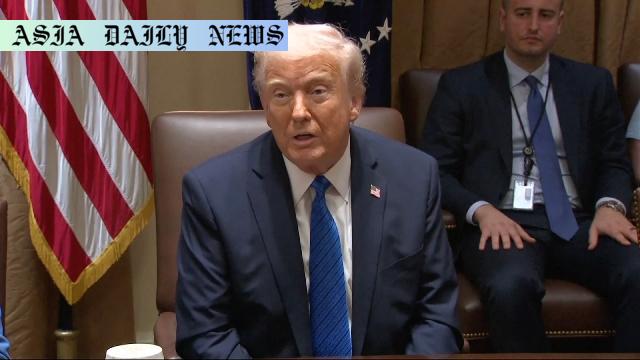Security Breach: Trump denies classified info in group chat amid public messaging platform controversy.
- National Security Advisor Mike Waltz denies responsibility for adding a journalist to a Signal chat group.
- CIA Director confirms Signal app is permissible for official communication with non-classified details.
- White House calls Democrats’ criticism of the incident a distraction from military success.

Security Breach Sparks Controversy Over Messaging App Usage
In a controversial turn of events, a reported breach in a top-level US administration chat group has raised significant concerns over the use of messaging apps for national security discussions. The incident, initially reported by The Atlantic, detailed how a Signal messaging group – a widely used app for secure communication – inadvertently included the editor-in-chief of The Atlantic magazine in its members list. This group purportedly discussed sensitive, though reportedly non-classified, details regarding strikes on Houthi forces in Yemen.
National Security Advisor Mike Waltz, who initiated the group, stated that there had been no direct communication with the Atlantic editor, indicating an unknown technical glitch as a possible cause of the mishap. Meanwhile, President Donald Trump attempted to downplay concerns, stating during a press interaction that he was informed there were no classified materials shared in the conversation. Trump’s defense of Waltz as “a very good man” who would continue his role notwithstanding the incident reflects a confident stance in resolving the matter internally.
Disputed Content and Expert Opinions on Classification
The discussion in question contained information about targets in Yemen, US weapon deployment, and operational plans. However, senior officials like CIA Director John Ratcliffe and National Intelligence Director Tulsi Gabbard testified that the information discussed was not classified. In a Senate Intelligence Committee hearing, the critical debate shifted toward whether the conversation’s content should be classified despite government claims that it meets the criteria of non-classification.
Democratic Party lawmakers seized the opportunity to demand greater transparency, requesting the Trump administration to share the exchanges publicly if they were indeed unclassified. The debate threatens to further polarize political lines, with opposing parties raising the stakes of the conversation. Tulsi Gabbard pointed out that legal and technical experts were already investigating the unexpected inclusion of the journalist in the chat but reassured lawmakers of no breaches in national secrecy.
White House Responds to Criticism
Amid intensifying scrutiny, the White House released a statement characterizing the Democratic response as a partisan effort to distract the public from President Trump’s successes in strengthening national security. The administration lauded the successful military operation targeting the Houthi forces, emphasizing that America’s adversaries were being held accountable. In their criticism of the media’s involvement, officials claimed that outlets like The Atlantic were fueling baseless controversies detrimental to national morale in critical moments.
While the administration’s stance aims to reassure the public of their competence and transparency, it has also deepened the political divide, sparking questions about secure communication practices at the highest levels of government. Analysts argue that this incident highlights the pressing need for a modernized, uniform protocol for handling sensitive communication and avoiding such lapses in future operations.



Commentary
Reflection on National Security and Modern Communication Tools
The recent controversy involving a potential security breach in a Signal chat group underscores both the rapid technological evolution of communication tools and the corresponding risks they introduce to national security. While apps like Signal offer significant benefits in terms of encryption and user privacy, this incident highlights the vulnerable gaps in digital practices within high-stakes environments like governmental operations. This begs the question: should more rigorous technological safeguards dictate conversations of sensitive nature?
The Need for Accountability and Frameworks
In light of the recent events, the role of accountability becomes evident. National Security Advisor Mike Waltz may not have directly caused the inclusion of an unintended participant, but this does not relieve the broader system of its flaws. The investigation into how such an error occurred must go beyond identifying the immediate cause and examine the gap in preventive measures. Establishing sound protocols and guidelines while training personnel across administrative levels will likely reduce future mishaps and foster confidence in the government’s operational decision-making.
Balancing Security, Politics, and Transparency
It is also worth reflecting on the broader political undertones of this incident. The Democratic Party’s call for transparency is a legitimate check on power, but it is entangled in political rivalries that overshadow the core issue – ensuring secure communication practices to protect national interests. Both the administration and opposition must ultimately work together to introduce reforms rather than use such incidents as political ammunition. After all, the core concern transcends party lines and touches squarely on questions of trust in government and national security practices.